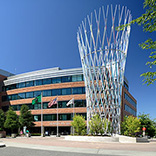Researchers at Fred Hutchinson Cancer Center have developed a new hybridoma cell line that expresses mouse anti MICA/MICB antibodies.
Reference:
- Bauer, et al., Science. 1999; 285(5428):727-9. “Activation of NK Cells and T Cells by NKG2D, a Receptor for Stress-Inducible MICA”;
- Groh, et al., Science. 1998; 279(5357):1737-40. “Recognition of Stress-Induced MHC Molecules by Intestinal Epithelial γδ T Cells”

Stress-induced expression and T cell recognition of MICA and MICB on quiescent intestinal epithelial cell lines. Lovo, HCT116, and HUTU-80 cells cultured for 8 days as confluent monolayers had very low steady-state levels of MICA and MICB mRNAs by blot hybridization of total cellular RNAs (A). They expressed small amounts of the encoded cell surface proteins by indirect immunofluorescence staining with mAb 6D4 and flow cytometry (shaded profiles in B) and were poorly lysed by the δ1B T cells (C). Heat shock treatment strongly increased MICA and MICB mRNA (A) and protein expression (filled profiles in B), and also sensitized target cells to lysis, which was inhibited by mAb 6D4 (C); hsp70 mRNA was potently induced and control HLA-B mRNA was unaltered (A). The hsp70 blot was exposed to film for a much shorter time. Open profiles in (B) are isotype IgG1 control stainings. HS, heat shock.
Available Licenses
To license this product, please complete, sign and return the license agreement to bds@fredhutch.org. Further instructions are provided therein.
Please Note: Academic and non-profit users may license the material for free. Fees for for-profit users are listed in the license agreements. All recipients must pay a fee for material preparation and shipping expenses.
Download license agreement
Commerical Use | Non-commerical Use
Credit Line for Acknowledgement
When publishing on the use of this material, please provide credit to Dr. Thomas Spies according to accepted publications standards.
Questions About this Product?
